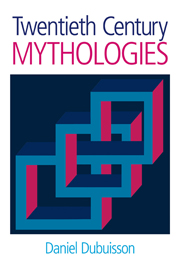Book contents
- Frontmatter
- Epigraph
- Contents
- Foreword by Professor Robert A. Segal
- Preface
- Abbreviations
- Introduction: History and comparative epistemology
- Part I Georges Dumézil, or Society
- Part II Claude Lévi-Strauss, or the Mind
- Part III Mircea Eliade, or the Sacred
- 12 Fascism and mysticism
- 13 Primitive ontology
- 14 The eternal return of anti-Semitism
- 15 The neo-paganism of homo religiosus
- 16 Metaphysics and politics: Eliade and Heidegger
- Addendum III Esotericism and fascism
- Addendum IV The reconstruction of prehistoric religions
- Addendum V The Eliadean conception of symbolism
- Addendum VI Forgetting the Shoah
- Conclusion: Modern theories of myth and the history of Western thought
- Bibliography
- Index
14 - The eternal return of anti-Semitism
from Part III - Mircea Eliade, or the Sacred
- Frontmatter
- Epigraph
- Contents
- Foreword by Professor Robert A. Segal
- Preface
- Abbreviations
- Introduction: History and comparative epistemology
- Part I Georges Dumézil, or Society
- Part II Claude Lévi-Strauss, or the Mind
- Part III Mircea Eliade, or the Sacred
- 12 Fascism and mysticism
- 13 Primitive ontology
- 14 The eternal return of anti-Semitism
- 15 The neo-paganism of homo religiosus
- 16 Metaphysics and politics: Eliade and Heidegger
- Addendum III Esotericism and fascism
- Addendum IV The reconstruction of prehistoric religions
- Addendum V The Eliadean conception of symbolism
- Addendum VI Forgetting the Shoah
- Conclusion: Modern theories of myth and the history of Western thought
- Bibliography
- Index
Summary
Founded on the sacred-profane opposition, Eliade's metaphysics had to show what he considered to be the personification of the profane. Eliade was no more orthodox a Platonist when he chose what would assume this role, for he attributed it to history in opposition to the Eternal Return and periodic regeneration of the cosmos by the rites that imitate the initial divine act of creation described by myths:
… the desire felt by the man of traditional societies to refuse “history,” and to confine himself to an indefinite repetition of archetypes, testifies to his thirst for the real [we understand: the ontic] and his terror of “losing” himself by letting himself be overwhelmed by the meaninglessness of profane existence.
(MER, 91–2)To understand the reasons for this choice and the importance ascribed it by Eliade, his most private prejudices and his most ambiguous convictions have to be chased out from hiding. For this we shall begin with his conception of time and with the first incoherence relative to it.
Whereas it should have been necessary to distinguish three notions at least (time, historicity, and historicism), Eliade expressly mixes them together. Now, the epistemological and philosophical problems raised by any one of them are not identical upon inspection, even if they are of equal complexity. So it was naive to think of resolving them all at once by subjecting them indiscriminately to a banal metaphysics of time. Let us nevertheless begin with this.
- Type
- Chapter
- Information
- Twentieth Century Mythologies , pp. 209 - 220Publisher: Acumen PublishingPrint publication year: 2006

